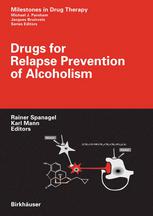

Most ebook files are in PDF format, so you can easily read them using various software such as Foxit Reader or directly on the Google Chrome browser.
Some ebook files are released by publishers in other formats such as .awz, .mobi, .epub, .fb2, etc. You may need to install specific software to read these formats on mobile/PC, such as Calibre.
Please read the tutorial at this link: https://ebookbell.com/faq
We offer FREE conversion to the popular formats you request; however, this may take some time. Therefore, right after payment, please email us, and we will try to provide the service as quickly as possible.
For some exceptional file formats or broken links (if any), please refrain from opening any disputes. Instead, email us first, and we will try to assist within a maximum of 6 hours.
EbookBell Team

0.0
0 reviewsAlcoholism is a pathological behavioural syndrome, characterised by comp- sive alcohol use, craving and relapses, even recurring after many years of abstinence. It is suggested that chronic alcohol abuse leads to persistent changes within several neurochemical pathways in the brain and furthermore that an imprinted drug and addiction memory may scarcely be extinguished. Hence, the question arises as to whether there ought to be a reasonable hope that pharmacological drugs will be developed that interfere with an addiction memory, and as a result, finally lead to a cure? In this book, leading preclinical and clinical experts in the field of alcohol relapse prevention strive to furnish an answer to this question. None of the researchers or clinicians believes in a magic bullet that will be of help to all alcoholic patients in overcoming this disease. However, there is now convi- ing evidence demonstrating that specific subpopulations of alcoholic patients experience satisfactory benefit from currently available treatments. Today we have two medications for relapse prevention on the market – acamprosate and naltrexone. Although, currently, only a minority of alcoholic patients benefit from these medications, the approval of these compounds may be considered a hallmark in the field of psychopharmacology, even comparable to the era when the first antidepressant compounds were introduced. In recent years we have been witnessing an enormous growth in the science and knowledge regarding the field of relapse prevention.